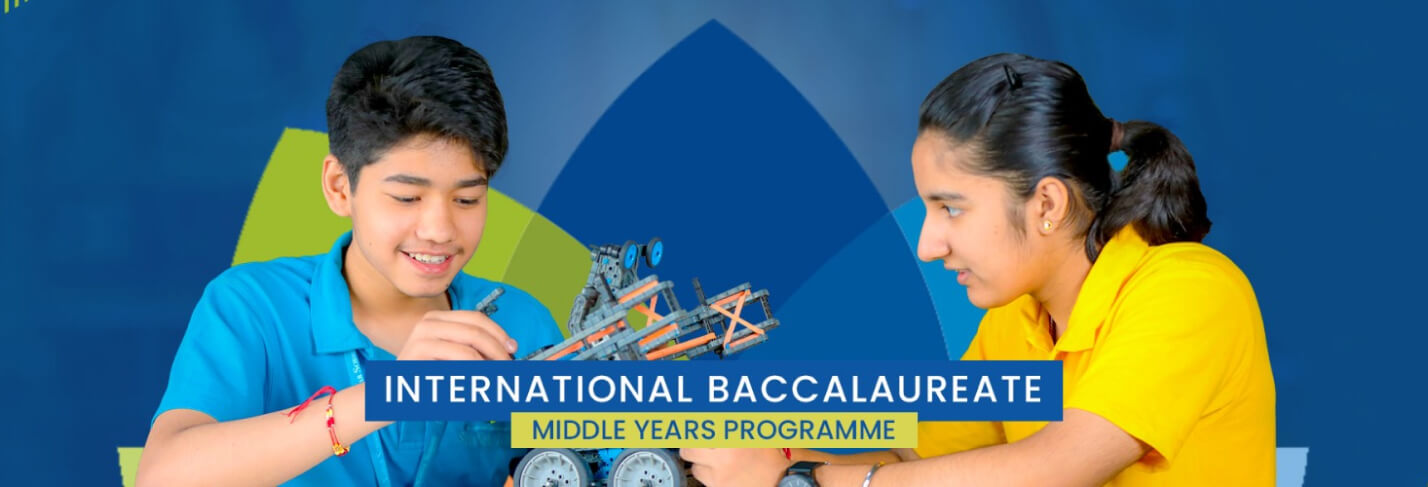SHIV NADAR SCHOOL
IB MIDDLE YEARS PROGRAMME (MYP)
Designed to promote intellectual curiosity, critical thinking, and a love of learning, the Shiv Nadar IB Middle Years Programme (MYP) offers a transformative educational experience that emphasizes interdisciplinary learning, international-mindedness, and the development of the whole person. As an IB school for the MYP, Shiv Nadar School is dedicated to implementing a world-class curriculum that prepares students for the challenges of the future.
The Middle Years Programme (MYP) is designed for students aged 11 to 16. It empowers students to make practical connections between their studies in eight subject areas and the real world. This contextual and conceptual learning approach focuses on how to learn rather than what to learn. It enables students to communicate effectively, embrace diversity, and engage meaningfully as global citizens—preparing them to lead in an ever-changing world.
DISCOVER EXCELLENCE: IB MYP AT SHIV NADAR SCHOOL
As adolescents navigate an increasingly complex world, the International Baccalaureate Middle Years Programme (IB MYP) aims to instill values and provide opportunities to help learners make informed decisions. The Shiv Nadar School IB MYP has been built around three fundamental principles aligned with the IB mission statement:
HOLISTIC LEARNING
The IB MYP emphasises that all knowledge is interconnected and encourages students to understand the interrelationships between different subject areas. Holistic learning also contributes to the individual's all-round development, encompassing academic, artistic, physical, social, emotional, and ethical attributes - as described in the IB Learner Profile.
INTERCULTURAL AWARENESS
The Middle Years Programme promotes international mindedness and encourages students to explore and appreciate other cultures - an attribute reflected in the IB Learner Profile. By learning about other social, national, and ethnic cultures, students develop a greater understanding and respect for other cultures as well as their own.
COMMUNICATION
In the IB Middle Years Programme, communication—both verbal and non-verbal—is considered foundational for learning. Language is integral to personal development, cultural identity, and intercultural understanding. IB MYP students develop their language skills and learn an additional language.
MYP Curriculum Framework
In line with our school philosophy, the MYP curriculum places the learner at the center of their own learning journey, empowering them to take ownership and make meaningful connections between different aspects of their studies and the world around them. This learner-centric approach is facilitated through the following features of the programme.
In the International Baccalaureate (IB) Middle Years Programme (MYP), students are equipped with essential Approaches to Learning (ATL) skills that empower them to become effective learners and lifelong achievers.
ATL skills encompass a range of abilities that go beyond subject-specific knowledge. They include critical thinking, research, communication, self-management, and social skills. These skills are interwoven throughout the curriculum, enabling students to develop a strong foundation for academic and personal growth.
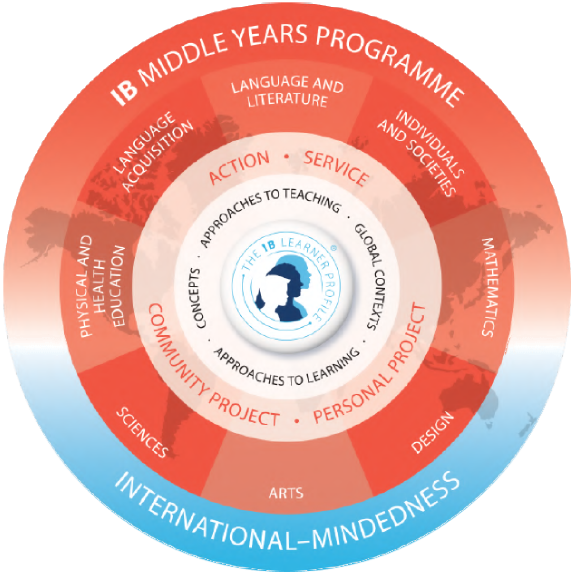
Shiv Nadar School Advantage
Seasoned and Trained
IB Faculty
Seasoned and Trained IB Faculty
Our team of experienced educators is committed to delivering exceptional learning experiences with care, knowledge and passion. All our IB educators have been trained in IB-recognised workshops and over 70% serve as IB examiners and workshop leaders. Each educator undergoes 200 hours of training annually and a significant number of international curriculum teachers are CENTA rank holders.
Dedicated Career
Guidance Centre
Dedicated Career Guidance Centre
A specialized team of seasoned experts assists students in choosing career paths that resonate best with their intellect and interest. Through their diverse initiatives and able guidance, our students have found themselves a home in acclaimed universities across 15 countries including Cambridge, Yale, Dartmouth New York University, UCL, University of Edinburgh, NUS, NTU, Parsons School of Design and Berklee College of Music amongst various others.
Deep focus on
the needs of the learners
Deep focus on the needs of the learners
Shiv Nadar School’s IB curriculum focuses on the development of the whole child, encompassing academic, social, emotional, and physical growth. It emphasises the importance of creating all-round students who are not just academically competent but also open-minded and principled.
Purpose-designed
Infrastructure
Purpose-designed Infrastructure
The infrastructure has been purpose-built to reflect Shiv Nadar School’s educational ideology. It follows global best practices and creates a learning environment to enable students to flourish. Our campuses across Noida, Gurgaon and Faridabad have 27 state-of-the-art labs and facilities. Our dedicated International Curriculum Wings ensure students receive the most superior learning experience throughout their course.
IB Learner Profile
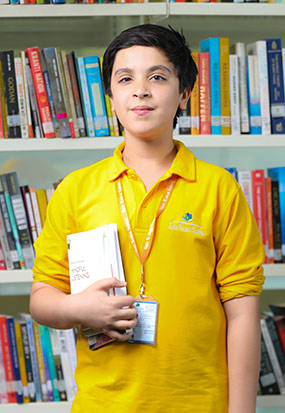
Knowledgeable
They explore a broad range of local and global topics and develop a deep understanding of various disciplines.
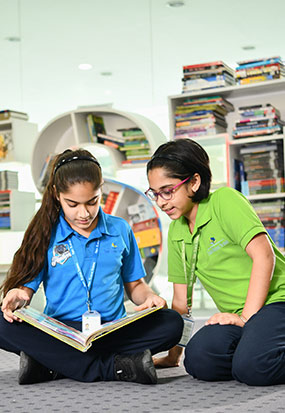
Inquirers
Children develop their natural curiosity, acquire research skills, and enjoy learning, sustaining this love for life.

Thinkers
They use critical and creative thinking skills to approach complex problems and make ethical decisions.

Communicators
They confidently and creatively communicate ideas and information in multiple languages and modes, collaborating effectively.
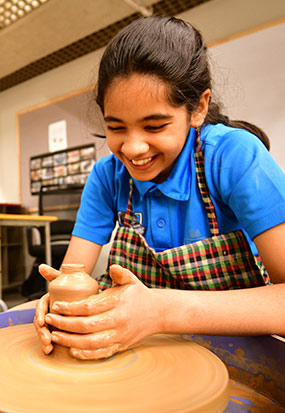
Principled
Individuals act with honesty, integrity, and fairness, showing respect for individuals, groups, and communities. They take responsibility for their actions and their consequences.
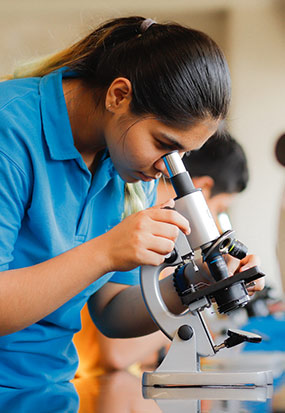
Open-minded
Culturally competent individuals respect diverse perspectives, seek to evaluate them and value their own culture and history while being open to learning from others' beliefs and traditions.

Caring
Individuals show empathy, compassion, and respect for others and are committed to making a positive impact on people and the environment.
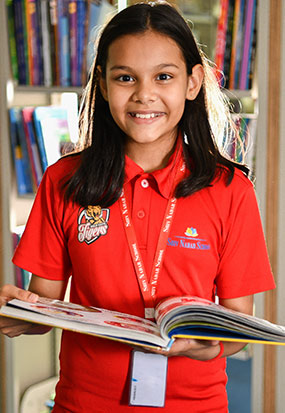
Risk-takers
They approach new situations with courage and explore new ideas independently.
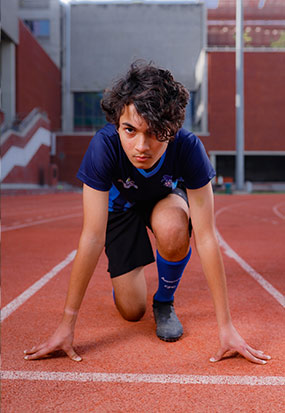
Balanced
They prioritize intellectual, physical, and emotional balance for personal well-being and others.
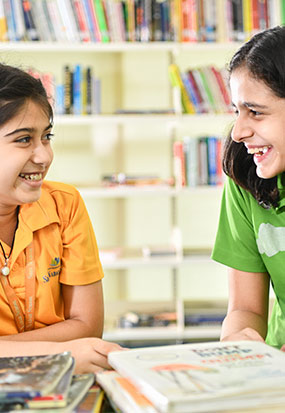
Reflective
They consider their learning and assess strengths and limitations for personal development.
Subject Groups
Within the MYP framework, students explore eight subject groups: Language Acquisition, Language and Literature, Individuals and Societies, Sciences, Mathematics, Arts, Physical and Health Education, and Design.
Each group focuses on developing specific knowledge, skills, and values, and provides opportunities for students to engage in inquiry-based learning, critical thinking, and creativity.


Language Acquisition
The Language Acquisition subject group is designed to develop students’ language skills in a second language. The objective of this subject group is to promote communication, cultural understanding, and the development of lifelong learners.


Language and Literature
The Language and Literature subject group is designed to develop students’ communication skills in their first language.
The objective of this subject group is to improve language proficiency, develop critical thinking and analytical skills, and encourage an appreciation for a range of literary genres and texts.


Individuals and Societies
The Individuals and Societies subject group aims to deepen students' understanding of the world by exploring the social, political, and economic factors shaping society. It promotes critical thinking, research, and analysis of historical and contemporary events, fostering an appreciation of democracy, citizenship, and human rights principles.


Sciences
The Sciences subject group is designed to provide students with a solid foundation in scientific principles and skills. The objective of this subject group is to develop an understanding of scientific principles and concepts, critical thinking and problem-solving skills, and an appreciation of the role of science in addressing contemporary global challenges.


Mathematics
The mathematics subject group is designed to provide students with a solid foundation in mathematical principles and skills. The objective of this subject group is to develop problem-solving and critical thinking skills, practical skills in mathematical modeling, data analysis, and interpretation, and an appreciation for the role of mathematics in addressing contemporary global challenges.


Arts
The Arts subject group: Dance, Drama, Art and Music is designed to foster creativity, expression, and cultural appreciation. The objective of this subject group is to develop practical skills in creating and presenting art, critical thinking and problem-solving skills, and an understanding of the role of the arts in society.


Physical and Health Education
The Physical and Health Education subject group is designed to promote physical fitness, healthy lifestyles, and teamwork. The objective of this subject group is to promote physical fitness, practical skills in various sports and activities, teamwork, sportsmanship, and leadership skills. contemporary global challenges.


Design
The Design subject group is comprised of two separate subjects; digital and product design.
The objective of this subject group is to develop creativity, practical skills in various design areas, an understanding of design thinking, and an appreciation of the role of design in society and the environment.


Interdisciplinary Learning
In the MYP, interdisciplinary learning helps students connect ideas and knowledge from different subjects to create new understandings. Students use concepts and methods from multiple disciplines to solve problems, create projects, or explore new questions in ways that wouldn’t be possible using just one subject.
Each year, students participate in at least one interdisciplinary unit, where they work on projects that combine knowledge and skills from two or more subjects.
Our Alumni across the globe
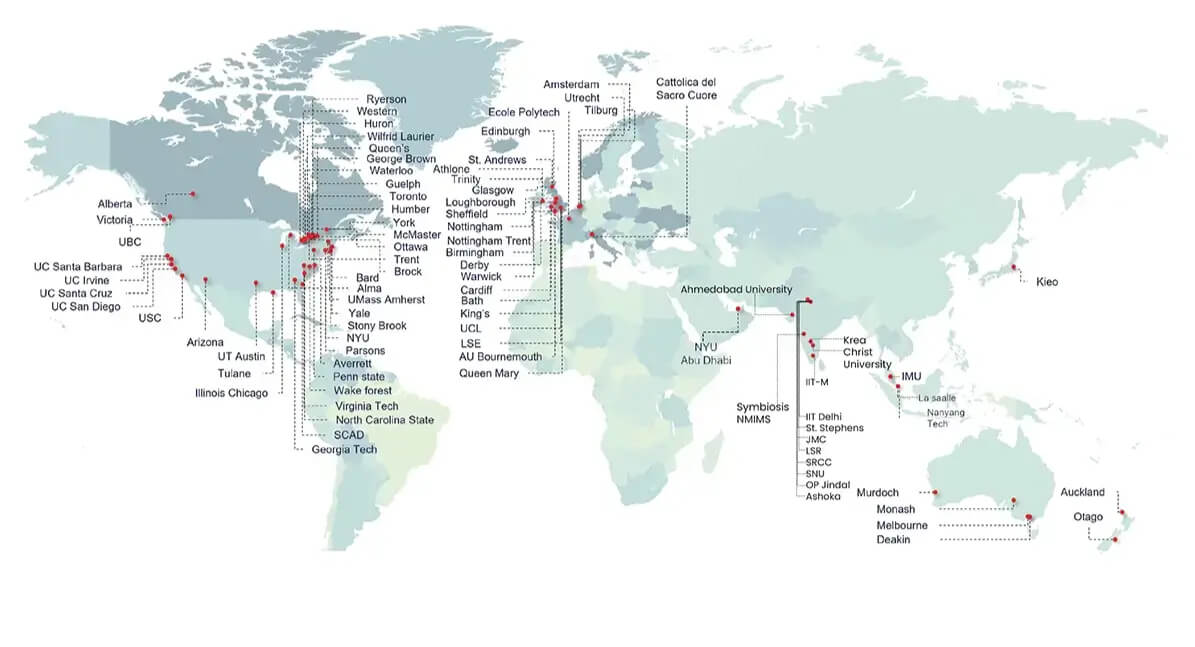
- 30 Students Studying Abroad
- 38 Students in Top 100 Universities
by Overall Ranking - 43 Students in Top 100 Universities
by Subject Ranking
IB MYP Students’ Experience
IB MYP Parents’ Perspective
Our decision to enrol Nehmat in the IB MYP programme was based on a clear understanding of the excellent curriculum design and a solid trust in its execution by the school’s passionate teachers. My daughter was nervous about starting in a new curriculum, but she has come back excited daily, sharing how engaging and research-based the coursework is. Interdisciplinarity is the hallmark of the curriculum, which makes it most relevant for the interconnected world we live in. My daughter often poses many questions at the dinner table that she is enquiring about, making learning so hands-on and relatable. I would accredit all of this to the invaluable support of the teachers who have gone above and beyond in supporting us and the students. We are even more excited about the learning journey that lies ahead.
Mr’s & Mrs Singh
(Parents of Nehmat Kaur, MYP1)
It is said that education’s purpose is not merely to fill the students’ minds. It teaches them about different possibilities and inspires changes in their mindsets. This statement befits the change we have seen in our son, Keshav, since he embarked on his journey, not just in his new school, Shiv Nadar School Noida, but also in a new curriculum, MYP, IB board ( Year 6 ). Despite weeks of relentless research and conversations with several ex-students, the idea of shifting him into the MYP system was quite sceptical. However, all thoughts dissipated right from day 1 when we saw Keshav, having been from a different mode of pedagogy earlier, totally owning his day at school. The ability to ask questions is the greatest resource for learning the truth. This is exactly what is portrayed in the inquiry-based learning and the research-based projects of the MYP curriculum rendering a well-rounded overall development. There is a lot of emphasis on an interdisciplinary approach to any concept, which enables them to broaden their horizon of thoughts and understand the overlapping of disciplines in any field. We must admit that the torchbearers in this journey are the teachers who have generated a globalised mode of thinking on any subject and a holistic environment, truly the need of the hour. At a very sensitive day and age, we feel that our decision in terms of Keshav’s education has only paved the way for him to rediscover himself with the best.
Dr Anshul, Dr Nandini Singhal
(Parents of Keshav Singhal, MYP1)
Frequently Asked Questions
The Foundation programme, at the beginning, helps the students get familiar with the required skills in the various subject areas. They get a sense of classroom experiences through interactive activities designed by teachers. That time is used to familiarise them with the attributes of IB learners. Some students adapt easily, but usually, by the end of the first term, most of the students are seen to be much more comfortable!
The students have ample opportunities to explore their areas of interest, as the topics of investigation in the internal assessments depend on choices made by the students. Each student formulates the subject and topic of the extended essay based on their passions and abilities.
MYP offers eight subject groups with choices embedded within individual groups at various stages of the 5-year MYP journey.
MYP 1 - Language Acquisition: the students choose one language from the following options: Hindi, French, German, or Spanish.
MYP 4:Mathematics - students select between Standard or Extended levels. ePortfolio - students choose one subject group from PHE, Design or Arts.
The MYP Personal Project is the culminating project for MYP students in year 5. It is a mandatory requirement to obtain a MYP certificate. Students choose their learning goal and product goal and document the entire process writing the ATL skills development during the process. This is a self directed project and prepares learners to become independent thinkers and problem solvers. .
*Shiv Nadar School Noida, Faridabad & Gurgaon are candidate schools for the Middle Years Programme (MYP). These are schools that share a common philosophy—a commitment to high-quality, challenging, international education that Shiv Nadar School believes is important for our students. Only schools authorised by the IB Organization can offer any of its four academic programmes: the Primary Years Programme (PYP), the Middle Years Programme (MYP), the Diploma Programme, or the Career-related Programme (CP). Candidate status gives no guarantee that authorisation will be granted. For further information about the IB and its programmes, visit www.ibo.org













